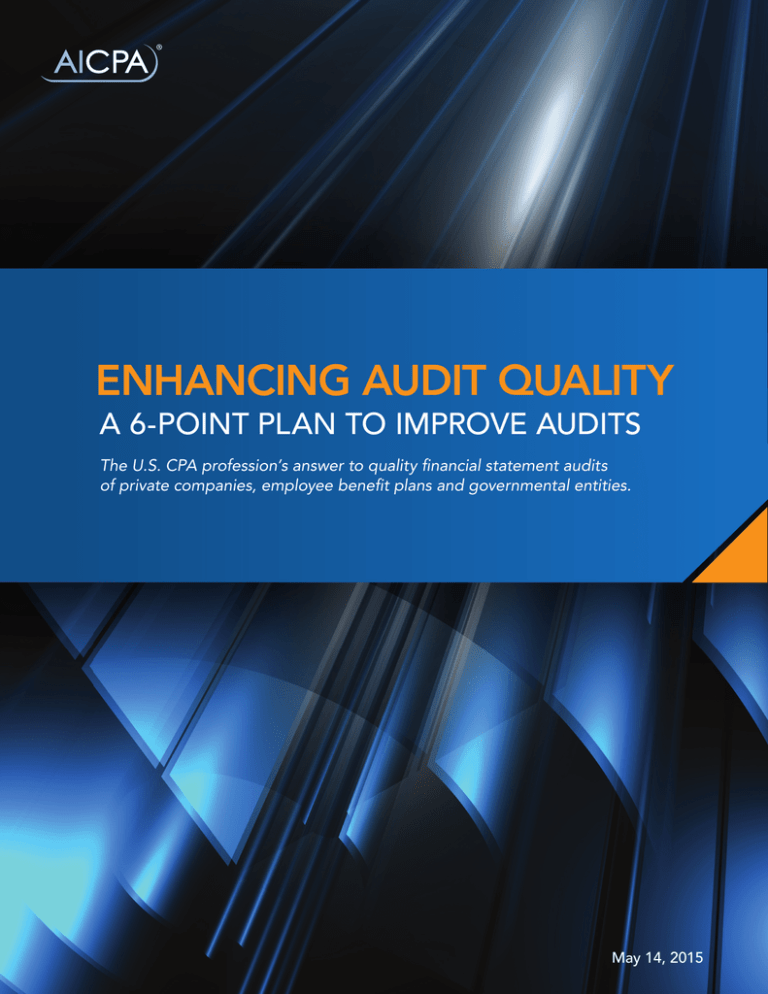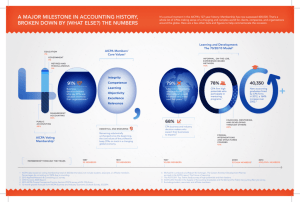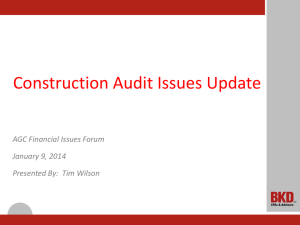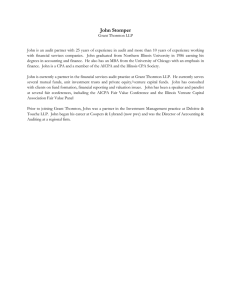
ENHANCING AUDIT QUALITY
A 6-POINT PLAN TO IMPROVE AUDITS
The U.S. CPA profession’s answer to quality financial statement audits
of private companies, employee benefit plans and governmental entities.
May 14, 2015
6-Point Plan to Improve Audit Quality
Overview
CPAs provide a wide range of services to the public, and auditing is at the very core of our
profession. The public’s reliance on the profession’s services is based on CPAs’ integrity,
objectivity and competence – essentially, a connection built on trust. Since the AICPA’s
founding in 1887, the Institute and the profession have been committed to achieving the highest
level of performance for financial statement audits.
The AICPA supports this commitment to audit quality by establishing auditing standards for nonlisted entities and quality control standards for accounting firms’ assurance practices, providing
educational guidance and implementation materials, as well as monitoring and enforcing
compliance with professional standards. These initiatives are the central foundation of the
profession’s quality assurance mission, and the AICPA constantly monitors and evaluates their
effectiveness to promote continuous improvement and compliance.
For the past couple of years, audit quality has surfaced as a focus around the globe, for both
public and private companies. In early 2014, the AICPA decided a broader, bolder step than
ever before was needed to bring solutions to the auditing challenges for private companies
(defined as non-SEC registrants, including not-for-profit organizations, employee benefit plans
and governmental entities).
The AICPA’s Enhancing Audit Quality (EAQ) initiative, launched in May 2014, addresses
quality challenges on a holistic, ongoing basis with the goal of improving audit performance,
particularly in specialized industries such as employee benefit plans and governmental entities.
In August 2014, the AICPA published a discussion paper seeking feedback from practitioners
and other stakeholders on ways to accomplish that goal. The paper, Enhancing Audit Quality:
Plans and Perspectives for the U.S. CPA Profession, outlined ideas and plans for driving
improved performance through all aspects of the audit process.
More than 860 comments were received in response to the discussion paper. In addition, many
groups shared their input as they discussed the issue with the AICPA during conferences,
meetings and other forums. The proposed actions and recommendations from respondents
were brought to the appropriate AICPA board, committee or task force for consideration and, if
appropriate, approval to move forward. This action plan summarizes the outcomes of all those
efforts and provides the U.S. CPA profession’s roadmap to improved audits.
AICPA 6-­‐Point Plan to Improve Audit Quality 2 Enhancing
Audit
Quality
6-Point Plan to Improve Audits
Pre-licensure
Next version of CPA Exam is designed to increase assessment of higher-order skills, such as critical thinking
and professional skepticism; high school AP accounting course; changes to college-level accounting
education; additional doctoral-level audit professors with practical experience
Standards and Ethics
Quality control standards implementation support; evaluation of clarified standards implementation; auditor’s
report revisions; ethics code codification
CPA Learning and Support
Competency models for audits, including employee benefit plan and governmental, competency assessment
tools, targeted resources to develop competencies; certificate programs to demonstrate competence; nano,
blended and informal learning programs
Employee Benefit Plan and Governmental Audit Quality Centers’ resources, tools and training; Center for
Plain English Accounting; audit guides, risk alerts and practice aids
Peer Review
Focus on greater risk industries/areas, including EBP and Single Audits; more significant remediation including
pre-issuance reviews and aggressive follow-up; root cause analysis (for poor and good quality); termination
from peer review after repeat quality issues
Practice Monitoring of the Future
Long-term initiative for near real-time, ongoing monitoring of firm quality checks using robust technological
platform
Enforcement
Aggressive investigation of all referrals of deficiencies; enhanced coordination with state boards of accountancy
having ability to restrict license to practice; reinforced Code of Professional Conduct rules on due care
AICPA 6-­‐Point Plan to Improve Audit Quality © 2015 American Institute of CPAs. All rights reserved.
3 Pre-licensure
The journey to continued audit quality starts before an accountant earns licensure as a CPA.
Licensure requires meeting the “3 Es”: education, exam and experience. The AICPA has
programs to help the academic community align education with CPAs’ work environments. In
addition, the AICPA develops and grades the Uniform CPA Examination.
Accounting Education
The AICPA is working with the College Board to establish a high school advanced placement
(AP) course in accounting. Such a course would attract highly talented students likely to seek
the CPA credential. The AP course would demonstrate the extent of knowledge and
commitment to the public trust required of the profession.
The Pathways Commission on Accounting Higher Education in 2012 produced several
recommendations that are in process to improve university-level accounting education for the
next generation.
The Accounting Doctoral Scholars program was created in 2008 by the AICPA Foundation and
the largest accounting firms, with funding from many accounting firms, nearly all of the state
CPA societies and the AICPA. The program funds doctoral students with real-world experience
who concentrate in audit. Upon completion of their PhDs, these scholars accept faculty
positions at colleges and universities throughout the country.
CPA Exam
The AICPA CPA Examinations team is in the midst of a comprehensive research effort to
develop the next version of the CPA Exam, launching in 2017. The vision for the new exam, to
be released for public comment in September 2015, is to better evaluate not only the knowledge
of CPA candidates, but also their ability to apply that knowledge (i.e., competence), including
critical thinking skills and professional skepticism, both of which are important drivers of audit
quality.
Standards and Ethics
Standards set the requirements and processes for the audit engagement and the firm’s quality
control system. Following the audit and quality control standards, while adhering to the Code of
Professional Conduct, would result in a quality audit.
Auditing and Quality Control Standards, Auditor’s Report
The AICPA Auditing Standards Board (ASB) recently completed a project to rewrite generally
accepted auditing standards and the quality control standards so auditors can better understand
and apply them. Practitioners’ implementation of these standards is being monitored to determine
whether the standards have the appropriate level of specificity to drive quality audits.
An AICPA task force is developing a number of new tools, resources and courses to improve
practitioners’ compliance with the Statements on Quality Control Standards (SQCS). The task
force has developed three new SQCS practice aids based on firm size available as free
AICPA 6-­‐Point Plan to Improve Audit Quality 4 downloads from the AICPA website. The task force also is crafting industry-specific
supplements to the practice aids to address specialized areas like Single Audit and employee
benefit plans (EBP).
In summer 2015, the AICPA will offer a webcast to help firms mitigate quality control risks while
performing efficient and effective audits. Participants will receive a toolkit with a variety of
resources jointly developed by the Private Companies Practice Section (PCPS) and the AICPA
Peer Review team. The material from the webcast will be offered in live seminar workshops at
numerous state CPA societies later this summer and fall. In 2016, the AICPA will begin offering
a virtual group-study course focused on SQCS compliance for small firms.
In addition to the efforts to increase compliance with quality control standards, the ASB also is
working to improve the communicative value and relevance of the auditor’s report through
proposed revisions to generally accepted auditing standards, including revisions to the going
concern standard and the standard addressing the auditor’s responsibility for other information
in documents containing audited financial statements.
Ethics Code
AICPA members are held to high ethical standards that are set forth in the robust requirements
in the AICPA Code of Professional Conduct. The standards include mandates to act with
integrity and objectivity, maintain independence and exercise due professional care and
competence when performing audit and attest services for clients. To make the Code easier to
use, in early 2014 the AICPA’s Professional Ethics Executive Committee completed a five-year
project to reorganize and restructure the Code of Professional Conduct.
The new online ethics code includes a conceptual framework for public accountants (and one
for CPAs in business and industry) that users can employ in making ethical decisions on issues
not specifically covered in the Code. The revised Code has powerful search functionality and
other enhanced features that facilitate identifying and complying with rules governing practice.
CPA Learning and Support
Professional competency matters. The ability to apply professional knowledge is fundamental to
CPAs performing at the highest levels of quality. The AICPA is transforming its educational
offerings to align with the learning demands of today’s CPAs.
Education and Resources
In February 2015, the AICPA launched the AICPA | CIMA Competency and Learning website,
offering a new way for CPAs to approach learning and competency development. The site
includes competencies covering technical, business, people and leadership skills in various
areas, as well as ethics, integrity and professionalism. It allows practitioners to assess their
competencies and, based on the assessment, links to tools and resources to assist them in
building competencies. Employee benefit plan-related competencies are included.
Governmental accounting and auditing (including Single Audit) will go online this summer.
AICPA 6-­‐Point Plan to Improve Audit Quality 5 In early 2016, the AICPA will launch comprehensive EBP and Single Audit certificate programs
designed to differentiate auditors with strong competency who practice in these specialized
areas.
Experience and Training Requirements
Under its Future of Learning initiative, the AICPA has issued recommendations on ways to
modernize how CPAs learn and grow their competencies. As part of that mission, the AICPA is
working with the National Association of State Boards of Accountancy (NASBA) and others to
explore changes to educational requirements for CPAs that would revolutionize the continuing
professional education (CPE) measurement model so that credit is awarded based on
competency gained instead of time spent. Additionally, an exposure draft (released in May
2015) for the AICPA/NASBA Statement on Standards for CPE Programs creates an opportunity
for CPAs to earn CPE in smaller increments that are easily accessible and are one of many less
formal learning channels that research shows are more likely to enhance competency.
Audit Quality Centers and CPEA
The AICPA’s Governmental and Employee Benefit Plan Audit Quality Centers have undertaken
numerous new initiatives designed to improve audit quality, and to help prospective clients
select a qualified auditor. Center members also participate in highly successful webinars and
discussion forums, receive timely e-alerts and other valuable support.
In addition, the newly launched Center for Plain English Accounting is a national, one-stop
resource assisting regional and local firms with understanding complex and challenging
accounting and auditing issues. Employee benefit plan audits are one of the key topics of focus
for the CPEA.
Peer Review
Several near-term changes to the AICPA Peer Review Program will drive improvements in audit
performance and produce immediate results.
Enhancing Quality of Peer Reviewers
The AICPA is improving the quality of peer reviewers by increasing the qualifications required to
perform a review, greatly enhancing the oversight of reviewers and expediting removal of poor
performers.
In addition to assessing reviewer performance, the enhanced oversight program will also
include root cause analysis, with the goal of determining which quality control policies and
procedures have the strongest correlation to audit quality. Those findings will be communicated
to the profession so firms can learn from them and model their audit engagements to
incorporate best practices.
Targeting Firm Quality and Accountability
Audit quality is heavily influenced by the robustness of an accounting firm’s system of quality
control. To improve detection of audit quality issues, the AICPA is introducing an enhanced
practice monitoring approach that requires:
AICPA 6-­‐Point Plan to Improve Audit Quality 6 •
•
•
Deep dive reviews of certain specialized industries and areas of practice, including
audits of EBPs and Single Audits
Enhanced testing of the firm’s controls to identify risks to audit quality
Increased accountability for firms that fail to comply with professional standards
The Peer Review Board (PRB) also is exploring requiring more timely reviews when a firm takes
on an audit in a new high-risk area in order to remediate any quality issues promptly.
Improving Engagement and Firm Tracking
The AICPA continues to work on measures that will improve peer review population
completeness. Firms failing to report engagements subject to peer review jeopardize their
enrollment in the program. Firms terminated from the Peer Review Program may be subject to
additional actions by their state boards of accountancy, including loss of their license to practice.
This fall, we will be capturing firms' federal Employer Identification Numbers (EIN) and
exploring options to compare that data with other available databases (e.g., Department of
Labor’s EFAST2 and the Single Audit Clearinghouse) to help ensure all firms that should be
enrolled in peer review are enrolled.
Practice Monitoring of the Future
With an eye to the future, this winter the AICPA will be piloting a new technology-based
quality monitoring tool that would allow firms to self-monitor their accounting and auditing
practices, enabling them to quickly leverage and implement prescriptive measures, in some
instances even before an engagement is completed.
On December 15, 2014, the Institute issued for public discussion a concept paper, Evolving the
CPA Profession’s Peer Review Program for the Future: A provocative vision of what practice
monitoring could become. This purposely provocative paper paints a picture of how the 35-year
old peer review program might be transformed into an ongoing, near real-time practice
monitoring program in the not-too-distant future.
The concept summarized in the paper demonstrates how firms could operate, and benefit from,
a reimagined practice monitoring system. It reflects the renewed emphasis that technology, risk
management, transparency and timely results have on firms, the accounting profession and the
worldwide business community.
Seeking to increase public protection through enhanced audit effectiveness, the program
described in the concept would:
•
•
•
Highlight potential quality risk indicators and detect engagement issues earlier
Review all firms that perform accounting, auditing and attestation engagements
Monitor all engagements subject to review
The monitoring of firm activities would encompass all accounting, auditing and attestation
engagements the firm performs.
AICPA 6-­‐Point Plan to Improve Audit Quality 7 The AICPA will use stakeholder feedback on the concept paper to develop the next evolution of
its practice monitoring system. In addition, pilot programs and evolving technology will play a
role in this iterative development process.
Ethics Enforcement and NASBA Collaboration
An effective enforcement process plays an integral role in audit quality. CPAs must adhere to
the ethics requirements set forth in the AICPA Code of Professional Conduct as well as by state
boards, which may differ. Beyond investigating cases involving deficient audits referred by
Inspectors General and the U.S. Department of Labor (DOL), the AICPA Professional Ethics
Division is proactively identifying deficient governmental and employee benefit plan audits by
reviewing publicly available information on the Federal Audit Clearinghouse and DOL’s EFAST2
websites.
When an AICPA member is found to be in violation of the Code, the member is subject to
remediation (e.g., continuing professional education, pre-issuance reviews of attest
engagements by an independent third party) and in some instances disciplinary sanctions, such
as admonishment, suspension or expulsion from AICPA membership. Disciplinary actions
involving admonishment or membership rights are published on the AICPA’s website and in the
Wall Street Journal, along with notification to the member’s state board of accountancy.
In addition, the AICPA is collaborating with NASBA on an initiative that would allow the AICPA
Ethics team and the DOL to share their respective investigative files with state boards. Such a
program would address concerns about the information some state boards need to perform
those investigations. To further strengthen coordinated ethics enforcement, the AICPA and
NASBA also have developed a plan to jointly support the work of state boards of accountancy.
Destination: Continued Audit Quality
With all these efforts taken together, what will success look like? Quite simply, the outcome of
the Enhancing Audit Quality initiative will be the continued strong reputation of the CPA
profession for competence, integrity and objectivity, coupled with a heightened understanding of
the audit’s value.
Each and every CPA contributes to the profession’s hard-earned reputation. Each and every
CPA is responsible for the public’s reliance on the services CPAs provide and maintains the
relevance of the profession’s work in the marketplace.
CPAs belong to a proud profession with an ongoing commitment to quality and a long history of
continuous improvement. The profession’s core service – the audit – deserves the time,
resources and energy needed to achieve the highest level of performance. Financial statement
users, company management, employee benefit plan sponsors, governmental entities,
regulators and other stakeholders expect no less.
The business environment is continually evolving, and doing so at a quick pace. CPAs must
keep up with the complexity and change, and so they continue on the journey to audit
excellence. Reinforcing the CPA profession’s commitment to the public interest, CPAs are
joining together to uphold the hallmarks for which the profession is known. AICPA 6-­‐Point Plan to Improve Audit Quality 8 © 2015 American Institute of CPAs. All rights reserved.
888.777.7077 | aicpa.org/auditquality
17568-312




